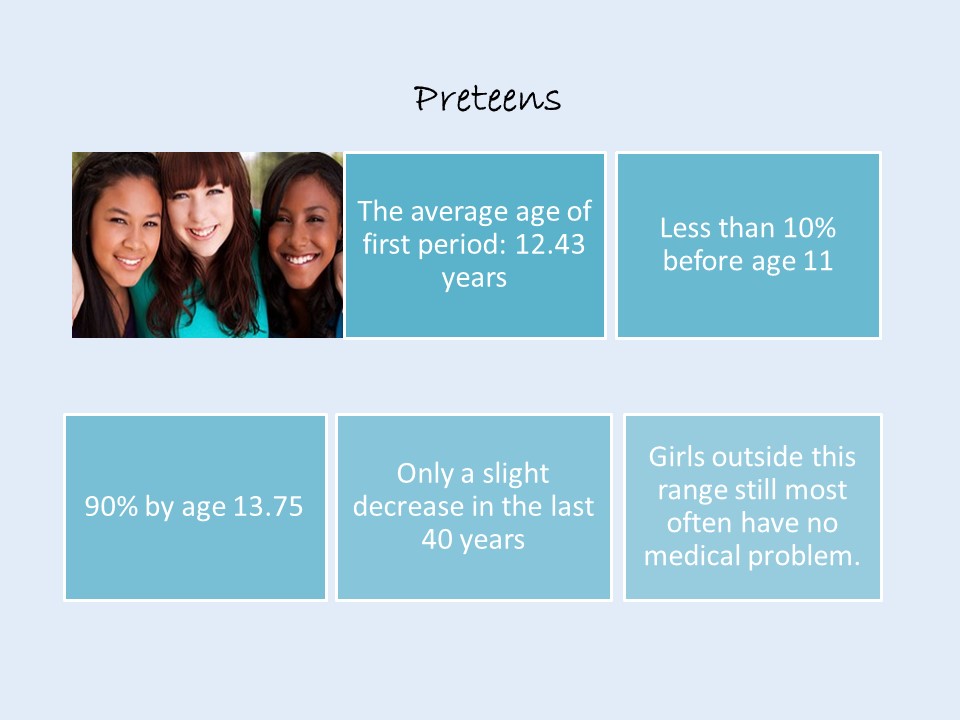As daughters enter the second decade of life, moms begin to alert themselves to subtle changes that signal the beginning of puberty. You look forward—with a little hesitation–to helping your pre-teen navigate the transition to young woman. For many of you, we shared the moment of your daughter’s birth, we have enjoyed hearing about childhood milestones at your annual visits, and occasionally you bring us questions about what to expect next.
As the mother of a daughter, I have shared some of your concerns, though my medical training answers the basic questions. Your child is about to enter a phase of rapid development like no other time since infancy, and the question we hear most often concerns “what is normal?” I’d like to offer a few facts to help you gauge the answer.
When does puberty occur?
Puberty is the time over which a child experiences physical changes that result in the capability to bear children. First, rest assured that most girls proceed through these years without serious problems. The time schedule for these changes varies greatly. In the U.S. the average age of a girl’s first period is 12.43 years. The age has decreased only slightly over the last half-century. Less than 10% of girls will start their period before age 11 and over 90% will reach this milestone by 14 years. Still girls outside of this range most often have no medical problem.
What are the first signs of puberty?
Puberty begins in the brain. Hormones from the brain stimulate the ovaries to produce estrogen. Estrogen causes the other body changes we recognize as puberty. Breast changes (breast buds) are usually the first sign you will notice. Breast tenderness and uneven breast development are normal at first. On average, a girl’s first period will occur about 2 or 2 ½ years later. Over the time in between, your daughter’s body shape will change, new body hair will develop, and her adolescent growth spurt will occur. Most girls will reach their adult height 1 to 2 years after their first period.
What is a normal menstrual cycle for my young daughter?
As you might expect, your young daughter’s menstrual cycle will be more variable or irregular at first. Early cycles average between 21 and 45 days. The time between a girl’s first and second period can be especially variable. As she matures, her cycles will typically shorten to the average for mature women of 21 to 34 days. Irregularity occurs because the ovary sometimes does not release an egg (ovulation) during early menstrual cycles. This is unpredictable, and therefore pregnancy is possible even in young teens. By the time girls are 19 or 20, most will have reached the pattern they will carry through their reproductive years. Early periods generally last between 2 and 7 days.
When should I be concerned?
Encourage your young daughter to keep track of her periods. The first day of her period is Day 1 of her menstrual cycle. She should note the number of days each period lasts and any problems, such as unusually heavy flow. Even though early cycles can be somewhat irregular, it is uncommon, once she has started her period, for a young girl to have no periods for 3 or 4 months. Chances are good that no medical problem exists, but we would recommend that you consider a doctor’s visit in this case. We can check to be sure that the cause is not a hormone issue. Other problems that interrupt normal menstrual cycles include eating disorders, excessive exercise or stress, certain medications, and of course, pregnancy.
Unusually heavy periods—for example, periods that require changing protection every 1 to 2 hours and/or last more than 7 days—might also be a cause for concern. Inform us about menstrual discomfort that seems unusually severe, long-lasting, or not relieved by ibuprofen products (Motrin, Advil, etc.).
In most cases, a doctor’s visit will not include a pelvic examination. We can provide reassurance to mother and daughter and help a young woman understand the relationship between her menstrual cycle and her overall health. We encourage young women to develop comfortable relationship with a doctor and to take responsibility for their reproductive health and preventive care.
We welcome your questions about your young daughter’s progress toward puberty, and appreciate your confidence in our care.
